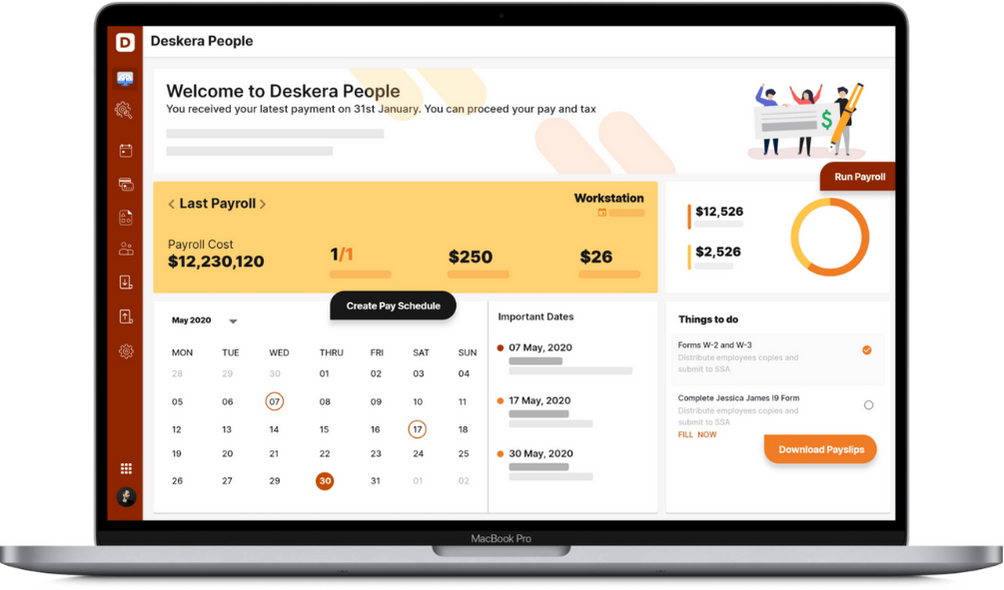If you are a business owner that employs other people or agencies for their skills and services, you necessarily maintain a payroll that records the compensations you pay to these professionals in exchange for their work. In Idaho, especially, maintaining payroll and keeping it updated and on track isn’t as complicated as in other states because payroll taxes in Idaho are, for the most part, in line with federal rules and regulations.
With that said, it is still required by your business to stay up to date with maintaining payrolls and staying compliant with taxation and other laws. Many companies, in order to avoid breaching compliances and getting penalized, frequently employ the services of professionals deft at managing payroll taxes in Idaho, or by using software dedicated for the purpose. Whichever method you select, in the end, staying compliant matters.
Let’s understand everything there is to know about Idaho, payroll taxes by covering the following topics:
Table of Contents
- Setting Up Payroll in Idaho
- Setting Up Your Business Officially
- Registering as a Tax-Compliant Business
- Setup Your Payroll
- Collect Employee Payroll Forms
- Work With Timesheets Ahead of Time
- File Idaho Payroll Taxes
- File Idaho State Payroll Taxes
- Documentation
- Year-End Payroll Reports
- Idaho Payroll Insurances
- Idaho Unemployment Insurance
- Idaho Payroll Taxes
- State Income Tax
- Idaho Payroll Tax Forms
- Idaho Minimum Wage
- Regulations for Overtime in Idaho
- Methods to Pay Employees in Idaho
- Cash Payments
- Payroll Checks
- Direct Deposit
- Pay Stub Laws in Idaho
- Minimum Pay Frequency in Idaho
- Rules for Deductions on Paycheck in Idaho
- Laws Regarding Final Paycheck
- Paid Time Off
- Conclusion
- Key Takeaways
Setting Up Payroll in Idaho
Businesses always begin with an idea – either birthed by a single person and shared by many, or honed and polished by a team. When your business comes into being and begins hiring people, it necessitates setting up a payroll roster to keep a track of their remunerations and stay compliant with Idaho, payroll taxes.
Here is a step-by-step process to set up your business in Idaho and prepare the systems to start paying Idaho, payroll taxes.
Setting Up Your Business Officially
In order to be officially seen and recognized as a business in Idaho, you need to apply for an Employer Identification Number (popularly known as EIN) at the Federal level. You can do this by creating an account on the Electronic Federal Tax Payment System.
Registering as a Tax-Compliant Business
The next step constitutes registering your business with your state tax commission, in this case, the Idaho State Tax Commission. This step helps you receive the Withholding Account Number for your business, also known as the Permit Number, to enable you to deposit payroll taxes in Idaho on a stipulated schedule (which you would also receive when registering).
Additionally, if your business meets one or both of the conditions listed below, you would also need to register with the Idaho Department of Labour:
- You pay $1,500 at least in wages every quarter
- Have an employee on the payroll for more than 20 weeks
Setup Your Payroll
As your business grows, so will your staff, and you would need to set up a robust system to track compensation, payroll taxes, and hours of every employee. Therefore, the next step is to acquire payroll software or hire a professional (or service) to ensure it gets done systematically and on time.
Collect Employee Payroll Forms
Once you are done setting up a payroll system, it is time to get it running with employee payroll and employment forms. Ideally, it is best to have every new hire fill out these forms to make it easier to track payroll taxes. You will need the forms W-4, I-9, and the direct deposit authorization form.
Work With Timesheets Ahead of Time
By law, it is required for your firm to communicate the scheduled paydays to your employees in writing so that a cycle can be established. Idaho payroll tax laws require to be filed on time, which necessitates you to collect the time cards of your employees on time as well.
File Idaho Payroll Taxes
Based on the schedule assigned while registering with the tax department, you need to file Idaho payroll taxes via the EFTPS. You also need to file Medicare taxes and Employer/Employee Social Security taxes based on the schedule provided. However, do note that the tax reporting schedule differs from tax deposition schedules.
File Idaho State Payroll Taxes
You would be required to pay the state taxes on the withheld salaries of employees either semi-weekly, monthly, or quarterly depending on the liabilities calculated. For these taxes too, the filing and payment deadlines aren’t the same – you would receive the schedule when you register for Idaho payroll taxes.
Documentation
It is important for every business to properly record every transaction, and the same holds true for Idaho payroll taxes. Even if the concerned employee is no longer employed with you, it is important to retain their payroll documents for a period of three to four years after they leave.
Year-End Payroll Reports
In order to get your year-end payroll reports in order, your business would need to fill out and complete W-2 forms for employees (and 1099s for independent contractors) before 31st January. The parties must receive these forms before this date every year.
Idaho Payroll Insurances
The payroll laws in Idaho are the same as federal laws. Therefore, there is less complication and filing involved as opposed to some states where the process is very elaborate (like California). The insurance laws, however, need some attention in Idaho to ensure that your business stays compliant and penalty-free. Let’s look at Idaho payroll insurances.
Idaho Unemployment Insurance
There exists an Unemployment Insurance benefit in Idaho which covers the entire state, which aims to reduce the burden of unemployment on an individual in case they lose their job due to unavoidable reasons. This noble cause is funded by employer contributions that measure up to the first $43,000 (in a calendar year) for every employee engaged with a business.
If your business qualifies for either of the following (or both) criteria, then your business needs to report the wages paid and also pay an unemployment insurance tax to the state:
- If you pay wages of at least $1,500 in a single quarter
- If you have employees at your firm who have been engaged with you for a period of more than 20 weeks
If you are a new employer, the insurance tax rate for the first 6 quarters of a calendar year that you would need to shoulder is 1%. This rate is likely to increase or decrease further down the line as your business gains more experience in paying insurance taxes, and also according to the claims filed (a greater number of claims filed on insurance tax typically work to increase the interest rate). However, certain employers are exempt from paying the insurance tax, some of them are:
- Independent contractors
- Direct sellers
- Insurance and real estate agents
Idaho Payroll Taxes
In Idaho, every employee who has been engaged with a firm for a salary is subjected to a withheld sum that is counted towards tax. It is the responsibility of the employer to withhold the amount stipulated by the State and do it timely, according to the prescribed schedules.
Idaho doesn’t impose any local taxes, apart from the Social Security and Medicare Tax that would still need to be complied with. Your business and your employees are required to pay 1.45% towards Medicare and 6.2% towards Social Security taxes.
Let’s now discuss Idaho payroll taxes in detail.
State Income Tax
Idaho imposes a gradually increasing income tax that goes up as your income increases over the years. The state imposes income tax in seven earning brackets, and the withholding sum can range anywhere between 1.25% to 6.925%.
Employees aren’t required to pay these taxes; however, the employers must file state income tax as per the proper bracket for each employee and do it timely. Employers can do that by filling out Form 910 (online), through the Idaho State Tax Commission. The timelines stipulated for payment of these taxes are as under:
- If your business withholds $750 in a quarter and less than $25,000 in a month, and if there is only one pay period every month, you need to file income taxes monthly
- If your business withholds at least $25,000 in a month and at least $3,00,000 in a calendar year, you need to file income tax twice every month
- If you are a farmer and need to file with the labor department, or if you withhold less than $750 every quarter, you need to file this tax quarterly
- If you are a farmer and don’t file with the tax department, or if you withhold less than $750 in a quarter, you need to file the income tax annually
Idaho Payroll Tax Forms
Although Idaho adopts many federal regulations for payroll taxes, it has its own dedicated forms for payroll tax withholding. Below is a list of Idaho payroll tax forms that you may want to keep ready for filing payroll taxes.
- Form ID-MS1 - Employees’ Idaho Military Spouse Withholding Exemption Certificate
- Idaho Withholding Payments Worksheet – the document that carries payroll records. This document does not need to be submitted anywhere – it is for your own recordkeeping and convenience
- Form 40 – form for individual tax returns for the residents of the state
- Form 910 – Withholding Payment
- Form 967 – Annual Withholding Report
Idaho Minimum Wage
Idaho has a higher tipped minimum wage. The rest of the minimum wage is filed as per the regulations laid out by federal law. There are, however, certain exceptions where minimum wage does not apply. If you or your business is one of the following, you are in the exceptions category:
- Seasonal camp employees
- Farmworkers
- Staff – whether executive, administrative or professional
- Salespeople
Various minimum wages as specified by the law are as under:
- The standard minimum wage is $7.25 an hour
- The tipped minimum wage is $3.35 an hour
- For employees under 20 years of age, working for 90 calendar days, the training minimum wage is $4.25 an hour
Regulations for Overtime in Idaho
Under the Federal Fair Labor Standards Act, it is required that overtime be recognized and paid for with time and a half worth of wages in compensation for the number of hours in a week exceeding 40. Idaho follows the federal regulations for overtime compensation to the workers. Like every other parameter, though, there are exceptions to this as well, which include:
- Farmworkers
- People employed with railroads, taxi workers, and air carriers
- Seasonal camp employees
- Seamen on vessels (American)
- Employees working at movie theatres
- Resident domestic service workers
- Assistance workers like babysitters, companions for the elderly, etc.
- Staff (administrative, professional, or executive)
- People in the media, like small newspaper company employees, news editors, announcers, etc.
Methods to Pay Employees in Idaho
Even though there are numerous methods to pay the people employed at a firm, Idaho Statute Section 45-608 stipulates that only the three methods mentioned below be used to pay the employees.
Cash Payments
Although paying employees using cash is legal in Idaho, it isn’t a very efficient method. For one, it makes keeping track of the payment problematic, since there is no record for cash payments – which leaves the employer responsible for maintaining accurate payroll. If you are planning to pay your employees in cash, follow these steps to make the process less complicated and more reliable:
- Calculate deductions and taxes accurately
- Establish an electronic payment stream to pay taxes as government agencies don’t accept cash
- Track work hours accurately
- Stick to payment schedules
- Have a separate account for payroll management
- Be sure to receive acknowledgment of payment from employees
- Create payroll records
Payroll Checks
Employers can purchase payroll checks from banks, buy some stock online, or from an office supplies vendor or a membership outfit for such supplies. You may need to get these checks customized with the company logo. Some of the other features of payroll checks you can consider are as under:
- Preprinted / blank checks
- Signature
- Compatibility
- Colour
- Security
- Layout
- Stubs
- Perforations
- Self-mailing
- Comment sections
If you are running on a budget and only want a functional paycheck, you may forgo customizations like color, reprinting, and company logo.
Direct Deposit
This is the most popular form of payment method used by employers since it allows them to deposit money in the employees’ accounts directly. All that is needed is a bank account number, approval, and a transfer service. You can follow the steps below to begin a direct deposit:
- Select your direct deposit provider and payroll software
- Either with your bank or with a payroll service provider, set up a direct deposit service
- Get authorization from the employees to initiate direct deposits
- Set a pay cycle and stick to it
Pay Stub Laws in Idaho
According to Idaho laws, it is required that the employer communicate the details of each payment made to the employees in some form (commonly known as the pay stub). It isn’t necessary for this pay stub to be physical or on paper – thus, electronic payments are still allowed as they form an official record of payment.
It isn’t strictly specified what kind of information needs to be written on a pay stub, therefore employers are at their own discretion with this. Additionally, there is no specified format to write paystubs either, just some form of acknowledgment that payment has been made and the amount.
Minimum Pay Frequency in Idaho
By law, it is required that the salary payment schedule be provided to the employees at the time of hiring. All the payments need to be made according to this schedule. Idaho mandates that the minimum payment frequency is one month – that there needs to be at least one payment in one month.
Rules for Deductions on Paycheck in Idaho
Idaho payroll taxes laws require that only the deductions mandated by law be made to an employee’s wages. Any other deductions to be made if required need to be authorized in writing in advance. It isn’t permitted to deduct anything from employee wages in any other way.
Laws Regarding Final Paycheck
In case an employee quits or is let go, Idaho has certain laws that lay out the rules governing the final paycheck. All the due wages for such an employee must be paid by the 10th regular working day from separation. If the employer receives a writ request for sooner disbursement, he must do so within 48 hours of receipt of the request.
Paid Time Off
There is no law in Idaho that requires the employer to pay an employee’s accrued vacations at the time of termination. However, in case there is a contract in place for the same, or if a policy exists that mandates it, the employer must pay for the employee’s accrued vacations.
Conclusion
Payroll taxes are required to be filed and reported by the employer in order to stay compliant with the laws of Idaho. Employees aren't required to pay their income taxes - it is the employer's duty to calculate and deduct it from salaries and ensure that these taxes are paid up on time.
How Can Deskera Assist You?
As a business, you must be diligent with employee leave management. Deskera People allows you to conveniently manage leave, attendance, payroll, and other expenses. Generating payslips for your employees is now easy as the platform also digitizes and automates HR processes.

Key Takeaways
- Idaho payroll taxes, for the major part, follow the federal setup in filing, reporting, and payment
- The state allows paying employees in three ways – cash, payroll checks, or electronic payments
- Whatever method they use, it is important for employers to maintain a proper record of payroll taxes, especially if they are paying in cash
- Idaho payroll taxes, depending on how much wages a business pays on a monthly/quarterly basis, are required to be paid either twice a month, monthly, quarterly, or annually
- There are seven income tax brackets according to which deductions are made by the employer
Related Articles












